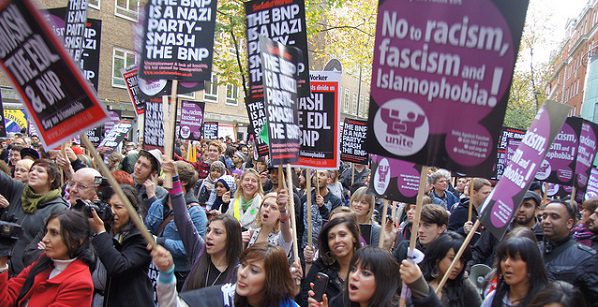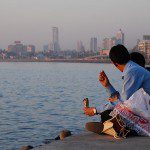
By Saud Inam
Recently nationwide rallies were held called the Global Rally for Humanity. These rallies, despite the misleading name, were actually blatantly Islamophobic rallies aimed at the Muslim American community. Most, if not all, of the rallies proved to be an utter failure with low attendance, which was a wonderful indication of how little interest there was to perpetuate hate in this manner.
But, the failure of the rallies is not an indicator that all is well in America or that Islamophobia is a relic of the past, as some have argued..
America today is very much dealing with the problem of Islamophobia at virtually every level of society. We saw the incident with Ahmed Mohamed, who was arrested due to his teachers thinking his home-made clock was a bomb, Samantha Elauf, who was discriminated against by Abercrombie & Fitch, and numerous other examples of Islamophobia. Just because the stories don’t get highlighted by the media doesn’t mean Islamophobia is decreasing in America.
This isn’t to say that things aren’t improving either, but merely to say let’s not begin patting ourselves on the back just yet. We cannot afford to fall asleep. As a community, Muslim Americans tend to rally together and respond when our backs are against the wall, but then fall back asleep when the threat is gone. Our memories seem to be short: Have we forgotten the tragic event that happened in February of 2015 in Chapel Hill where we lost Deah, Yusor and Razan in an execution-style murder by their neighbor?
Countering Islamophobia: Our Responsibility
Islamophobia very much is alive and well and will most probably continue for years to come. As a community, we cannot afford to become complacent and think everything is okay. We think Islamophobia is something new, but in fact Islamophobia began at the time of the creation of Adam and existed with every prophet of Allah — from Adam to Abraham, Noah to Moses to Jesus and Muhammad (peace be upon them all).
Countering Islamophobia is incumbent on each and every Muslim. We owe this to our innocent brothers and sisters who are dehumanized and are victims of warfare and oppression. Islamophobia, believe it or not is a global phenomenon. As Muslim Americans we are in the good position to counter it.
The Muslim American community (not to be biased) is well-organized and working hard at becoming better organized. With all of our flaws and weaknesses, we still are as effective, if not more, than other Muslim communities in other parts of the world, in tackling issues and problems in our own national and local communities.
Islamophobia is nothing more than a form of racism that every minority in America has faced. As a Muslim community, we must tackle this racism head on to establish ourselves as a core part of American society. Imagine for a moment that in the 1960’s African Americans didn’t march for civil rights and equal rights. Would minorities who came later to America ever be able to walk with dignity, honor and respect in America? It was because of those marches, protests and efforts by the African American community that minorities today have it a lot better.
If we don’t work to end Islamophobia, not only does our community suffer but other minorities suffer as well. We must counter Islamophobia just as the #BlackLivesMatter movement is countering anti-African American racism. In fact we must join and support the #BlackLivesMatter movement, as Islam speaks strongly against racism.
We must stand with justice on whoever’s side it is on — this is the sunnah (way) of the Prophet Muhammad (peace be upon him) and this is what Islam teaches us.
Da’wah: The Solution to Islamophobia
The question is how should we counter Islamophobia? Many of us complain about the condition of Muslims and misinformation and misunderstandings about Islam and Muslims, but how many of us have made da’wah a priority in our lives? You may be thinking “Da’wah? You mean like going out and converting people?” Unfortunately, most Muslims when they think of the word da’wah they think of handing someone a Quran translation or a brochures about Islam. But Islam is so much more than our narrow definition of thinking da’wah is essentially becoming a missionary and going to actively go convert people of other faiths. When we study the life of the Prophet Muhammad (peace be upon him) we learn that da’wah is calling to God by calling to all that is good.
This means calling for equality, justice, unity, women’s rights, environmentalism, human rights, civil rights, advocating for the poor and homeless and other social justice issues. The Prophet Muhammad (peace be upon him) made da’wah his life. Every moment of his life was da’wah. So many of us today think that the role of da’wah is relegated to just the imams or the scholars. But every one of us is responsible for doing da’wah.
You don’t need to be a super scholar or a super knowledgeable person to call for good in your community. Each of us has a role to play in society. Find your passion and calling and support that cause or issue. Don’t wait for Superman — BE Superman. Don’t tell yourself and make excuses of “I’m too busy, I’m a student I can’t do da’wah” or “I’m a doctor I don’t have time for da’wah.”
The companions of the Prophet Muhammad (peace be upon him) had various roles in society yet they called for good. They were businessmen, tailors, government administrators, and other professions yet they did da’wah. They made it a priority and that is why they were so effective in delivering the message of Islam and countering Islamophobia in their time.
As a community we must do the same.
Bismillah (in the name of Allah).
Saud Inam is a Muslim American activist, social entrepreneur, blogger and Project Manager for Discover Islam-USA a Muslim American media company dedicated to producing high quality media about Islam and Muslims. He is always on the lookout for more opportunities to help empower the Muslim American community.












